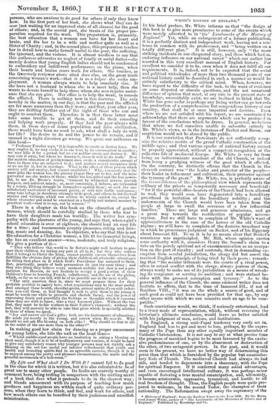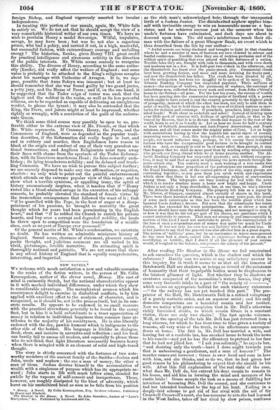WHITE'S HISTORY OF ENGLAND.
IN his brief preface, Mr. White informs us that "the design of this book is to give more prominence to some of the events which were merely adverted to in ' his' Landmarks of the History of Enyland.' Yet, while an enlargement of a former publication, it is a perfectly distinct and independent work, having not a sen- tence in common with its predecessor, and " being written on a totally different plan." It is still, however, only " the more strikiag incidents in our chequered story, and those which had at, enduring influence on our national career " which our author has recorded in this very excellent manual of English history. For excellent we consider it to be, even when it does not fulfil all our requirements. It is, indeed, not to be expected that the social and political vicissitudes of more than two thousand years of our national history could be described in such a manner as would be entirely satisfactory to the critical mind, When, however, we have regard to the difficulty of the task, to the want of evidence on some disputed or obscure questions, and the not unnatural difference of opinion that must, at any rate in the present state of knowledge, unavoidably exist, we are inclined to think that Mr. White has one as far as perhaps any living writer can go towards the production of a comprehensive but compendious history of our country, that shall be at once impartial and decisive. Even where we are not satisfied with his report, we are constrained to acknowledge that there are arguments which can be produced in favour of the conclusions which he draws. In general, we believe that where we feel ourselves unable to subscribe entirely to Mr. White's views, as in the instances of Becket and Bacon, our scepticism would not be shared by the public. It is our conviction that Protestants do not sufficiently recog- nize the relative merits of the grand Catholic construction of the middle ages; and that various epochs of national history cannot be properly appreciated, without a competent recognition of the collective life of mediveval Europe. Mr. White is very far from being an indiscriminate assailant of the old Church, or indeed from being a grudging witness of the good which it effected. On the contrary, he distinctly affirms that the Church in the eleventh century was "the leader and protector of the people— their leader in refinement and cultivation, their protector against the tyranny of the great." Mr. White, too, is perfectly aware of the reasonableness of the philosophical view which represents the celibacy of the priests as temporarily, necessary and beneficial: "for if the powerful office-bearers of the Church had been allowed to wed, they would soon have degenerated into a hereditary priesthood in imitation of the hereditary nobility ; and the endowments of the Church would have been taken from the people at large to swell the revenues of a few influential families." These are large and generous admissions, and go a great way towards the rectification of popular miscon- ception. But we still have to complain of Mr. White's want of appreciativeness in the ease of the heroes of the old Catholic regime; we still have to complain of the decisive trenchant way in which he pronounces judgment on Becket, and of his ffippancy about Innocent III. To us it is by no means clear that Becket 's conscience was unprincipled. Mr. Mill, whose opinion carries some authority with it, considers Henry the Second's claim to a veto on the purely spiritual act of excommunication as an usurpa- tion on the part of royalty ; and contends, that in demanding ex- emption from secular jurisdiction, the clergy did but assert the received English principle of being tried by their peers ; remark- ing that "the secular tribunals were the courts of a rival power, often in actual conflict with the clergy, always jealous of them, always ready to make use of its jurisdiction as a means of wreak- ing its vengeance or serving its ambition ; and were stained be- sides with the grossest corruption and tyranny." As to the general influence of the Church, the same eminent writer does not hesitate to affirm, that to the time of Innocent ILL, if not of Boniface VIII. "it was on the whole a source of good, and of such good as could not have been provided for that age by any other means with which we can conceive such an age to be com- patible."
Such convictions would, we think, if seriously entertained, lead to a truer mode of representation, which, without reversing the historian's ultimate conclusion, would leave us better satisfied with his judgment of men, actions, and institutions.
In England, a strong anti-Papal tendency very early set in. England had less to get and more to lose perhaps, by the supra. maey of the Pope than any other equally important member of Catholic Christendom. It is not easy to say at what precise time the progress of mankind begins to be most favoured by the exclu- sive predominance of one, or by the abasement or destruction of the other, of two antagonist powers. In the past, and it would seem in the present, we have no better way of determining this point than that which is furnished by the popular but unsatisfac- tory Rule of Thumb. The medifeval Church had always its bad side, and tended to degenerate into a theocracy, with the Pope
for spiritual Emperor. If it conferred many social advantages, and even encouraged intellectual culture, it was perhaps never capable of fostering a true mental emancipation, and, ultimately,
it became aristocratic, oppressive, tyrannical, and hostile to au real freedom of thought. Thus, the English people were quite pre- pared to welcome' in the second Tudor, the champion of their nationality. The Reformation swept away the supremacy of the • History of England; from the Earliest Times to the Year 1858. Ry the Here- rend James _White, author of "The Landmarks of the Histories of Greece and of England." Published by Routledge and Co.
foreign Bishop, and England vigorously asserted her insular independence.
In treating this portion of our annals, again, Mr. White fails to satisfy us. We do not ask that he should accept the view of a very remarkable historical writer of our own times. We have no wish to proclaim Henry a model Sovereign. Wilful, impulsive, savage, he may have been ; but was he not also a sagacious prince, who had a policy, and carried it out, in a high, masterful, but successful fashion, with extraordinary courage and unfailing energy ? The historian, Ranke, gives Henry VIII. great credit for practical intelligence and strenuous activity in the direction of the public interests. Mr. White seems scarcely to recognize this ability. The divorce of Henry, according to the same autho- rity (Ranke), did really affect the welfare of England ; and some value is probably to be attached to the King's religious scruples about his marriage with Catherine of Arragon. It is, we sup- pose, possible that Anne Boleyn was innocent ; but at least we should remember that she was found guilty by two grand juries, a petty jury, and the House of Peers ; and if, on the one hand, it be suggested that the Tudor reign of terror was such that the highest and the noblest in the realm, as well as its less powerful citizens, are to be regarded as capable of delivering an unrighteous verdict, to please the tyrant ; it may also be contended that the King, the Peers, and jurors might at least be impressed, whether rightly or wrongly, with a conviction of the guilt of the unfortu- nate Queen.
We think some third course may possibly be open to us, pre- ferable either to the extreme view of Mr. Froude, or that which Mr. White represents. If Creamer, Henry, the Peers, and the Commoners of England, were as degraded as the popular tradi- tion describes, if the Reformation did really begin in lust, and end in robbery and murder, then Englishmen have reason to blush at the origin and conduct of one of their very grandest na- tional transactions, and Anglican Religionists must turn away' their faces with shame from the spectacle of the Tudor Reforma- tion, with its licentious murderous Head ; its false cowardly arch- bishop ; its lying treacherous nobility ; and its debased and truck- ling Commons. We have no wish to pursue this subject further; we are scarcely disposed to make any one affirmation, or negation, absolute : we only wish to point out the painful embarrassment which attends on the extreme popular view of this reign ; and to show what a terrible cynicism, or appalling irony, the spirit of history unconsciously inspires, when it teaches that if "Henry rioted like a blood-stained savage in the execution of his unhappy consorts, he probably elevated the standard of female virtue by the tremendous consequences that followed the want of it ; that "if he quarelled with the Pope, in the heat of anger at a disap- pointment of his passions, he brought to maturity the great thought which for years had been germinating in the English heart," and that "if he robbed the Church to enrich his private hoards, and buy over a corrupt and degraded nobility, the lands he threw open to competition were the foundation of a middle class, such as no part of Europe ever possessed!" Of the general merits of Mr. White's condensation, we entertain no doubt. He has written an admirable miniature history of England. Sound sense, clearness of statement, pleasant conceit, poetic thought, and judicious comment are all united in his vivid, picturesque, forcible narrative. Its animating spirit is thoroughly national and patriotic. We are not aware that there is any school history of England that is equally comprehensive, interesting, and impartial.



























 Previous page
Previous page